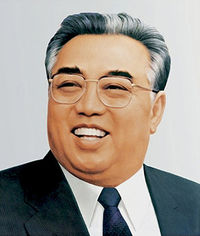Kim Il-sung Politician
Kim Il-sung (15 April 1912 – 8 July 1994) was the leader of the Democratic People's Republic of Korea, commonly referred to as "North Korea", from its establishment in 1948 until his death in 1994. He held the posts of Prime Minister from 1948 to 1972 and President from 1972 to his death. He was also the leader of the Workers' Party of Korea from 1949 to 1994 (titled as chairman from 1949 to 1966 and as general secretary after 1966). His tenure as leader of North Korea has often been described as autocratic, and he established an all-pervasive cult of personality. From the mid-1960s, he promoted his self-developed Juche variant of communist national organization, which later replaced Marxism-Leninism as the ideology of the state in 1972. In the Library of Congress Country Study on North Korea in 2009, he was described as "one of the most intriguing figures of the twentieth century". He outlived Joseph Stalin by four decades, Mao Zedong by two, and remained in power during the terms of office of six South Korean presidents, 7 Soviet leaders, ten U.S. presidents, and twenty-one Japanese prime ministers. Following his death in 1994, he was succeeded by his son Kim Jong-il, who in turn was succeeded by his son Kim Jong-un. North Korea officially refers to Kim Il-sung as the "Great Leader" (Suryong in Korean 수령) and he is designated in the North Korean constitution as the country's "Eternal President". His birthday is a public holiday in North Korea.
Personal facts

| Alias (AKA) | Kim Ilsong Gim Il-seong 김일성 金日成 |
|---|---|
| Birth date | April 15, 1912 |
| Birth place | |
| Nationality | |
| Religion | |
| Date of death | July 08, 1994 |
| Place of death | |
| Residence | |
| Children | |
| Profession |
Search
Office holder
| office | President of North Korea Prime Minister of North Korea Supreme Leader of North Korea |
|---|---|
| party | |
| service end | 1941 |
| service start | 1941 |
| successor |
Kim Il-sung on Wikipedia
External resources
- http://bbs.keyhole.com/ubb/ubbthreads.php?ubb=showflat&Number=165472#Post165472
- http://digitalarchive.wilsoncenter.org/collection/138/conversations-with-kim-il-sung
- http://koreanunification.net
- http://nothingtoenvy.com
- http://www.findagrave.com/cgi-bin/fg.cgi?page=gr&GRid=8241723
- http://www.jstor.org/stable/2642612
- http://www.korea-dpr.com/lib/202.pdf
- http://www.wilsoncenter.org/index.cfm?fuseaction=topics.home&topic_id=230972
- http://www.wilsoncenter.org/index.cfm?topic_id=230972&fuseaction=topics.publications&doc_id=474527&group_id=474507
- http://www.wimp.com/ceausescuvisit